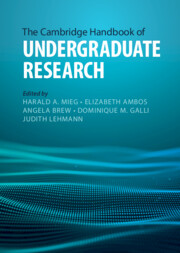Book contents
- The Cambridge Handbook of Undergraduate Research
- The Cambridge Handbook of Undergraduate Research
- Copyright page
- Contents
- Figures
- Tables
- Contributors
- Foreword
- Foreword
- 1 Introduction
- Part I Theory and Research on Undergraduate Research
- Part II Implementation, Approaches, Methods
- Part III Disciplines
- Part IV International Perspective
- 47 Introduction
- Part IV.1 Americas
- Part IV.2 Africa & Middle East
- Part IV.3 Asia & Oceania
- 58 Undergraduate Research in China
- 59 Undergraduate Research in India
- 60 Undergraduate Research in Indonesia
- 61 Undergraduate Research in Japan
- 62 Undergraduate Research in Australia
- 63 Undergraduate Research in New Zealand
- Part IV.4 Europe
- Part V Avenues for Developing Undergraduate Research
- Index
- References
63 - Undergraduate Research in New Zealand
Toward Student-Driven Practices
from Part IV.3 - Asia & Oceania
Published online by Cambridge University Press: 11 August 2022
- The Cambridge Handbook of Undergraduate Research
- The Cambridge Handbook of Undergraduate Research
- Copyright page
- Contents
- Figures
- Tables
- Contributors
- Foreword
- Foreword
- 1 Introduction
- Part I Theory and Research on Undergraduate Research
- Part II Implementation, Approaches, Methods
- Part III Disciplines
- Part IV International Perspective
- 47 Introduction
- Part IV.1 Americas
- Part IV.2 Africa & Middle East
- Part IV.3 Asia & Oceania
- 58 Undergraduate Research in China
- 59 Undergraduate Research in India
- 60 Undergraduate Research in Indonesia
- 61 Undergraduate Research in Japan
- 62 Undergraduate Research in Australia
- 63 Undergraduate Research in New Zealand
- Part IV.4 Europe
- Part V Avenues for Developing Undergraduate Research
- Index
- References
Summary
New Zealand has an integrated but differentiated system of tertiary education, and within this, it is the universities that have a long tradition of research and research-informed teaching. The Tertiary Education Strategy emphasizes the role of faculty as researchers, and the need for internships and research of value to employers; in practice it supports a conventional model of students as research apprentices. Universities do not have offices dedicated to undergraduate research, service learning or community engagement to encourage student engagement in research projects shaped by undergraduates rather than their teachers. Nonetheless, good examples of student-driven practices are identified in a range of disciplines, including the humanities, engineering, ecology and geography. Examples are given at assignment, class and curriculum levels. An important component of these in New Zealand is an awareness of and some competency with respect to Māori culture, given the requirement in the national Education Act that institutions acknowledge the principles of the Treaty of Waitangi, which is the country’s foundational constitutional document.
Keywords
- Type
- Chapter
- Information
- The Cambridge Handbook of Undergraduate Research , pp. 573 - 580Publisher: Cambridge University PressPrint publication year: 2022

